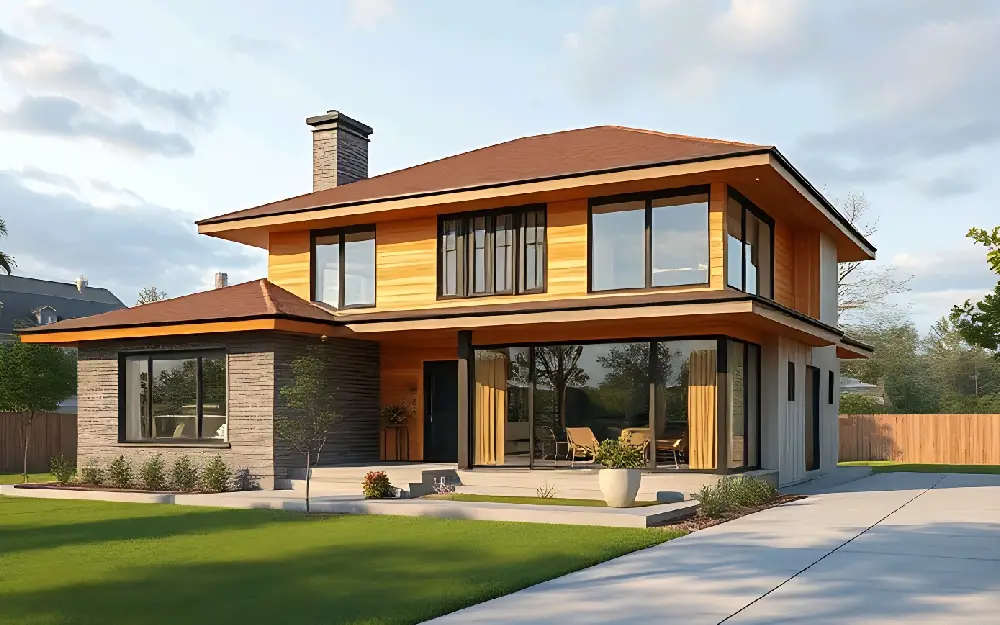
Revolutionizing Home Building: The Benefits of Hybrid Construction Methods
In recent years, the home building industry has experienced significant advancements, and one of the most exciting developments has been the rise of hybrid construction methods. Combining traditional building techniques with modern innovations, hybrid construction offers a unique blend of durability, energy efficiency, and cost-effectiveness that is transforming the way homes are built. If you're considering building a new home, understanding the benefits of hybrid construction could help you make a more informed choice. Let’s dive into what hybrid construction is and why it's becoming such a popular option.
What Are Hybrid Construction Methods?
At its core, hybrid construction involves the integration of both conventional materials and cutting-edge building techniques. This could mean combining traditional materials such as wood, brick, or stone with more modern options like prefabricated panels, steel framing, or advanced insulation. The aim is to create homes that are not only structurally sound and visually appealing but also built faster, more efficiently, and with a lower environmental impact.
The result is a home that offers the best of both worlds: the warmth and character of traditional materials combined with the strength, precision, and cost-effectiveness of modern technologies.
Key Features of Hybrid Construction
1. Combining Traditional and Modern Materials
Hybrid homes often feature a blend of time-honored materials and innovative techniques. For example, timber framing might be used alongside prefabricated concrete panels for walls and floors. This combination allows for homes that retain the aesthetic charm of traditional construction, while benefiting from the durability and cost-efficiency that modern materials provide.
2. Prefabrication and Modular Construction
One of the standout features of hybrid construction is the use of prefabricated components. These elements—walls, floors, roofs, windows—are built off-site in a factory setting, which speeds up the overall construction process. Not only does prefabrication minimize material waste, but it also allows for better quality control and ensures precision. The result? A faster build time and a home that is built to a higher standard.
3. Sustainability and Energy Efficiency
Hybrid construction often emphasizes sustainability, incorporating energy-efficient features like high-quality insulation, solar panels, and eco-friendly materials. These homes are designed to reduce energy consumption, making them both environmentally friendly and cost-effective in the long run. With energy-efficient homes, homeowners can look forward to lower utility bills and a smaller carbon footprint.
4. Customization and Design Flexibility
Despite the use of prefabricated materials, hybrid construction methods offer great flexibility in terms of design. Homeowners can still choose from a wide range of styles, finishes, and layouts, ensuring their home meets their aesthetic preferences while benefiting from the speed and cost-efficiency of modern methods.
The Benefits of Hybrid Construction Methods
The popularity of hybrid construction methods is rooted in the tangible benefits they offer to homeowners. From a faster build time to long-term savings, here are just a few reasons why hybrid homes are a smart choice:
1. Faster Construction Timeline
Since a significant portion of the home is prefabricated off-site, hybrid homes can be built much faster than those using traditional methods. What would normally take several months to complete with conventional building techniques can often be finished in a fraction of the time. For homeowners looking to move into their new home quickly, hybrid construction is an appealing option.
2. Cost Efficiency
Hybrid construction is often more cost-effective than traditional building methods. Reduced labor costs, fewer delays, and the use of prefabricated materials all contribute to lower overall construction costs. Additionally, hybrid homes are typically more energy-efficient, which means homeowners can save money on utility bills over time.
3. Increased Durability and Strength
Hybrid homes make use of highly durable materials like steel framing and reinforced concrete. These materials offer superior strength and resistance to damage compared to traditional wood framing, resulting in a home that is not only more secure but also more resilient to the elements. This ensures long-term structural integrity.
4. Reduced Environmental Impact
One of the major selling points of hybrid construction is its eco-friendliness. By using sustainable materials, incorporating renewable energy solutions like solar panels, and reducing construction waste through prefabrication, hybrid homes have a much smaller carbon footprint than homes built with traditional methods. For those looking to reduce their environmental impact, hybrid construction is a step in the right direction.
Hybrid Construction in Action: A Visual Example
Imagine walking through a hybrid construction site where traditional and modern building techniques are seamlessly integrated. You might see workers carefully assembling prefabricated concrete panels into steel framing structures, while other team members install windows, doors, and finishing touches like wooden accents. The construction site is organized and waste is minimized, showcasing the efficiency of hybrid construction.
In another area of the site, workers are installing solar panels on the roof, and advanced insulation materials are being applied to the walls to enhance energy efficiency. The result is a home that not only meets modern standards but is also designed to stand the test of time.
The Future of Home Building
The future of home building is all about innovation and efficiency. Hybrid construction methods are at the forefront of this shift, offering homeowners faster, more affordable, and sustainable solutions for building their dream homes. As technology continues to evolve, we can expect to see even more advancements in construction techniques that further improve the speed, cost, and sustainability of home building.
Conclusion
Whether you're a first-time homebuyer or looking to upgrade your current living situation, hybrid construction methods offer a wealth of benefits. From faster construction and cost savings to increased durability and sustainability, hybrid homes are revolutionizing the home building industry. If you're ready to build a home that combines the best of both worlds—modern technology and traditional materials—hybrid construction might be the perfect choice for you.
Have you considered hybrid construction for your new home? What aspects of modern building techniques matter most to you? We’d love to hear your thoughts and experiences!


